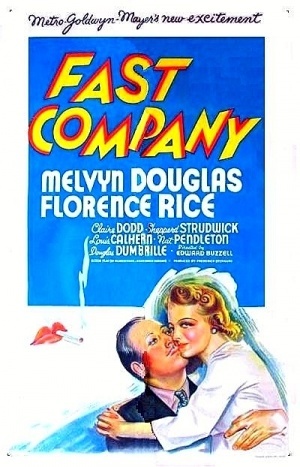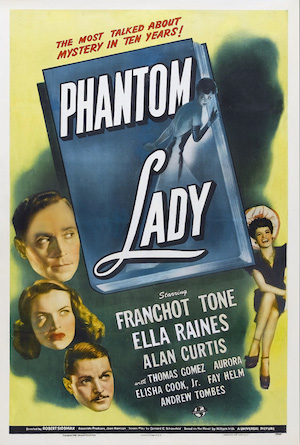By Scott A. Cupp
This is the 158th in my series of Forgotten, Obscure or Neglected Films
Bibliomysteries are a rare thing indeed and bibliomystery films are even rarer. So when I first read Marco Page’s Fast Company as a paperback novel years ago, I was hooked. Later, when I found that it had been filmed, I was there.
Apparently after the public fell in love with Nick and Nora Charles in 1934’s The Thin Man and its 1936 sequel, there was a clamor for mystery/comedy films featuring married couples. But there was a delay for the third Thin Man film, so MGM looked and found the novel Fast Company. Suddenly, a film adaptation was in the works.
Both the book and the film feature the married couple Joel and Garda Sloane (Melvyn Douglas and Florence Rice). Joel is a rare book dealer in New York City and times are a little tight. His primary income (at least in the film) is from helping the insurance companies recover stolen books they have paid out claims for. His wife Garda works in his office as the secretary and money sink. In an early scene, she admits to having sold a copy of Treasure Island for $200 and spending the money on a new dress.
One competitor to Sloane is Otto Brockler (George Zucco!!!), who is allied with Eli Bannerman (Louis Calhern!!!) in moving stolen rare books. Earlier, the insurance companies paid out $50,000 to Brockler for books supposedly stolen by Ned Morgan (Sheppard Strudwick), who’s in love with Brockler’s daughter Leah (Mary Howard). Joel Sloane is convinced Ned is not guilty, but the courts saw otherwise, so Ned went to prison.
Ned is now out of prison and wants to marry Leah, but Brockler isn’t having that. Tension arises. Bannerman, working with Sidney Wheeler (Dwight Frye!!!), a book forger, has had a stolen first edition of Leaves of Grass made into two copies and is selling them to Brockler. Bannerman is, of course, cheating his partner by saying that he is getting only $2,000 for the pair rather than the $5,000 he has negotiated. Wheeler is understandably upset.
Things get even more tricky when Brockler is killed, smashed in the head with the brass eagle statue (his good luck charm) on his desk. Ned looks good to the DA (Thurston Hall). Sloane decides to help Ned and gives him some money. Of course, he is soon captured. He’s appointed an attorney, Arnold Stamper (Douglass Dumbrille!!!).
Joel decides to see if Brockler’s secretary, Julia Thorne (Claire Dodd), knows anything. He comes on to her and proposes a partnership to split any insurance money recovered if the stolen books are found. She recalls seeing a hidden safe in Brockler’s office and many rare items are recovered.
Garda, of course, does not like Joel flirting with Julia and the whole relationship. Neither does Bannerman who has Sidney shoot Joel. He fails, only wounding Joel in the tush.
More hijinks ensue and Joel does eventually solve the murder and reunite the lovers. All ends well.
The studio apparently liked Fast Company well enough to green light a second film, Fast and Loose, in 1939. This time, though, Robert Taylor and Rosalind Russell played Joel and Garda. A third film Fast and Furious, also from 1939, featured Franchot Tone and Ann Sothern as the couple.
The films are great fun, but the lack of a continuing cast in the top-billed roles may have hurt their success. All three also are available on a DVD for less than $20. They’re short; all are 75 to 80 minutes in length. I enjoyed all three, so I say check them out.
Only the first film, Fast Company, is based on a book, though. Marco Page (Harry Kurnitz) wrote it and assisted with the screenplay of all three films. The book is even better than the movie, and it’s also well worth seeking out.
Series organizer Todd Mason hosts more Tuesday Forgotten Film reviews at his own blog and posts a complete list of participating blogs.


